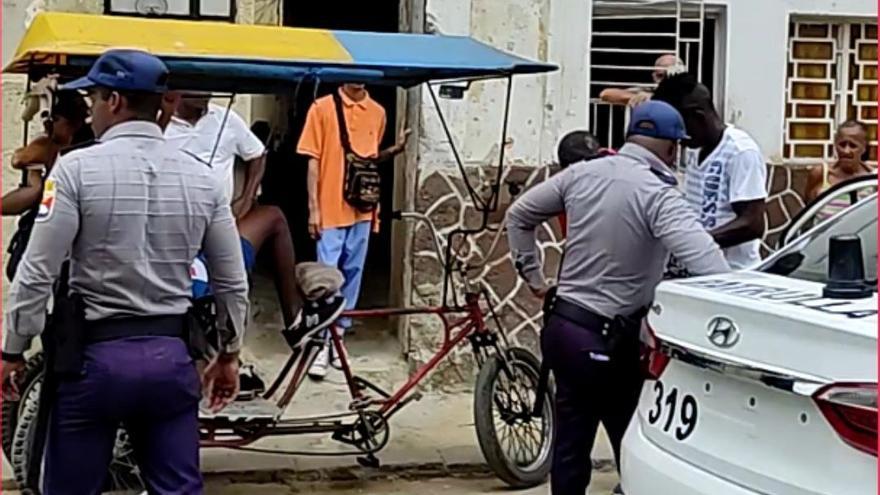
![]() 14ymedio, Havana, 5 April 2023 — The Cuban Conflict Observatory (OCC) recorded 372 demonstrations against the regime during the month of March. In its most recent report, the Miami-based organization also documented numerous cases of repression against activists and human rights defenders.
14ymedio, Havana, 5 April 2023 — The Cuban Conflict Observatory (OCC) recorded 372 demonstrations against the regime during the month of March. In its most recent report, the Miami-based organization also documented numerous cases of repression against activists and human rights defenders.
In its report, the Observatory highlighted the reappearance of graffiti with slogans offensive to the Government, such as “No to the Communist Party” or “Down with the dictatorship.” In addition, it detected an increase in protests by 60.3% compared to the 232 registered in March of the previous year.
However, taking into account the 711 demonstrations reported in February 2023, there has been a decrease that the OCC explains: the organization has decided not to include in its inventory, as they have been doing so far, the permanent campaigns of 200 activists.
The Observatory reported protests in 15 provinces of the Island, of which Havana, with 126 incidents, accumulated the majority. According to the report, of the demonstrations that took place in March, 189 were related to the claim of political and civil rights (50.8% of the total), while 183 were caused by demands for economic and social rights (49.2%).
During the month of March there were also several events related to the elections of deputies to Parliament, the ones with the lowest attendance since 1959. At least 8.1 million people were called to participate in the process, but 70.92% of the electoral roll attended, a figure that the Observatory finds unreliable.
The report also points out that the regime took advantage of the elections to repress several dissidents and independent journalists. In the middle of the electoral process, journalist Julio Aleaga Pesant was arrested and handcuffed for two hours inside a police car. Days later, a car with a military license plate rammed the car in which he was traveling through the capital. One of the collaborators of Diario de Cuba in Santiago de Cuba, Amado Robert Vera, was also harassed by State Security.
In addition, three CubaNet reporters — Enrique Díaz, Ángel Cuza and Osniel Carmona — were monitored in their homes and told to stay inside on election day. Finally, the organization stated that the regime prevented independent observers from monitoring the voting and observing the counting in the polling stations.
The Observatory stressed that crime and citizen insecurity intensified in Cuba in March. “What is most worrying are the violent crimes, especially by gangs of adolescents and children.” In the different provinces, in the first three months of the year, 10 murders took place in an attempt to steal a phone, a gold chain or an electric bike.
Femicides were also an alarming issue, the report said, with 19 murders between January and March (half of the total number of victims registered on the Island in 2022, which closed with 36).
In its report, the organization reiterates that insufficient wages and rampant inflation exacerbate social discontent, while mental illnesses increase, in a panorama of lack of medicines. “A one-off case revealed the apathy of people who witnessed the spectacle of an elderly woman with mental disorders who came out naked to protest. Those around her laughed or filmed her with their cell phones, but it took time before someone deigned to help her.”
The repression in the context of the parliamentary elections also occupied a central place in the report of another NGO, the Cuban Observatory of Human Rights (OCDH), based in Madrid. A total of 363 repressive actions of the regime were registered by the organization in March, of which 64 occurred during the voting.
Of these cases, 93 corresponded to arbitrary arrests and 270 to “other abuses.” There were 27 acts of harassment against political prisoners, and multiple police arrests were also reported, including that of Cuban YouTuber Hilda Núñez, alias Hildina.
Another notable case, the OCDH added, was that of activist Aniette González, arrested on March 23 and prosecuted for “outrage” to the Cuban flag in Camagüey. As for the political prisoners, they denounced the lack of medical attention to Maikel Puig and the violence of the jailers against Yuliesky Méndez, both in the Quivicán prison, in Mayabeque.
Translated by Regina Anavy
____________
COLLABORATE WITH OUR WORK: The 14ymedio team is committed to practicing serious journalism that reflects Cuba’s reality in all its depth. Thank you for joining us on this long journey. We invite you to continue supporting us by becoming a member of 14ymedio now. Together we can continue transforming journalism in Cuba.
